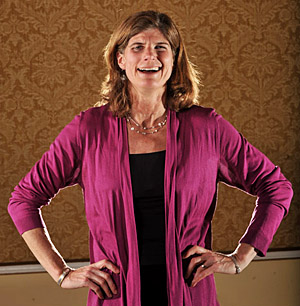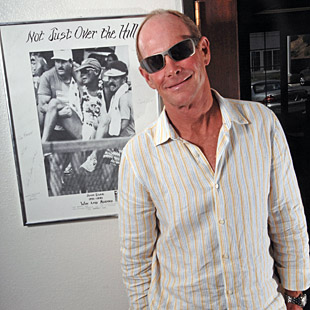Funky dude Bob Babbitt
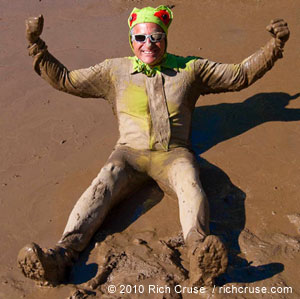
While there is a some famous musician named Bob Babbitt, in the sport of triathlon only one Bob Babbitt matters. In fact there is hardly an element of the sport where you don't cross paths with funky dude Bob Babbitt. He talked to slowtwitch and here is part 1 of this 2 part interview.
Slowtwitch: You just had a super busy weekend behind you, with the Competitor Endurance awards, the Tri Expo and various San Diego Tri club activities.
Bob: It has been an amazing few days. We put together an awesome Q&A with Craig Alexander and Chris Lieto last Thursday for the Tri Club of San Diego and we had 400 folks there. It was our largest crowd ever for one of our Q&As. My favorite part was when Chris Lieto was chatting about racing Craig at the Boise 70.3. Lieto led onto the run and had a lead cyclist with him. He asked the guy to let him know if someone was coming. 8, 9, 10, 11 miles in, the guy tells him he’s fine. Then just past 12 miles, without any warning the guy screams out “CRAP!” Turns out Crowie was only 50 yards back and closing fast. At that point it was too late. Crowie ran Lieto down and won the race by 2 seconds.
On Friday we had our first ever Tri Expo and we had a few hundred folks in line before we opened at 11:00 am. Some of the people were there at 7 am. Besides a great expo we had clinics from Jim Vance, Chris Carmichael, Craig Alexander, Dean Karnazes, Kristin Armstrong, Allen Lim, Josh Cox and Jessi Stensland. Every clinic was jammed both Friday and Saturday and the Tri Expo was a blast. Dean Karnazes was leading out rides on this funky vehicle called the ElliptiGO and that was a huge hit as well.
On Saturday morning the Tri Club of San Diego put together our Breakfast Burrito Ride and Run. How about this? 200 riders on the 25 mile or so ride with Chris Lieto, Craig Alexander, Kristin Armstrong and Chris Carmichael. On the 3 and 6 mile run there were 80 or so joining Sarah Reinertsen, Kara and Adam Goucher, Dean Karnazes, Jessi Stensland, Michellie Jones and Josh Cox. The Tri Club did an amazing job and then everyone headed over to Tri Expo.
Saturday night was our 18th Annual Competitor Endurance Sports Awards Gala.
ST: With all this work done, can you now relax?
Bob: I’m heading off to Las Vegas on Thursday for a Columbia Muddy Buddy Clinic at the Sports Chalet in the area. We’ve expanded to 18 Muddy Buddies this summer from 13 last year. We had over 27,000 participants with us. We’re now in our 11th Muddy Buddy season and we’re going to be north of 35,000. The main reason I go in to do the clinics is so people understand that Muddy Buddy is not the most serious event in the world.
Because it’s a leapfrog style event where you take turns riding and running, the frog is our mascot and I’m the guy in the frog suit. Funny story. A few years ago a guy comes up to me after the event and goes. “Hey, I had to wait a few seconds at the inflatable behind a couple of guys, and I think if I didn’t have to wait I might have placed in my division.”
I was like, “Look, I’m in a frog outfit. The last time I checked Muddy Buddy had not yet been accepted into the Olympic Games. If you’d like a medal I’ve got one in my pocket.”
He laughed and headed off to the beer garden.
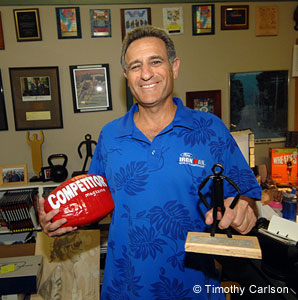
ST: You seem to be juggling several jobs, which one of those keeps you occupied the most these days?
Bob: Jobs? Let’s see… I get to talk to and write about amazing athletes in Competitor Magazine. Then I get to talk to those same athletes on the radio show. When it comes to our 18 event Muddy Buddy Series, I get to wear a frog outfit and slither through a mud pit and with the Challenged Athletes Foundation I spend those hours learning the true meaning of courage. I don’t think I really have a job and I’d sort of like to keep it that way.
ST: So which passion occupies you the most?
Bob: I don’t play favorites… I love everything I do. The magazines, Columbia Muddy Buddy, the Ironman Program, the Competitor Gala, the Radio Show and the Challenged Athletes Foundation.
ST: Competitor Magazine is your longest standing commitment business wise, but that wasn’t your first involvement with a multisport magazine.
Bob: I was actually a PE teacher at a small private school in San Diego called The Children’s School. I first moved to San Diego from Chicago in 1978. I was rock climbing in Baja-I was pathetic at that- and I met a guy named Ned Overend who was working at San Diego Suzuki as a mechanic. How long ago was that? Ned would go on to become the world mountain bike champion, but his sport had yet to be invented so, after he and I did the Ironman in 1980 with 106 other wackos, he moved on to mountain running, ice climbing and road cycling before kicking butt on the trails. Funny story. Ned’s girlfriend at the time, Pam, was his support person during that 1980 Ironman. Well, Ned got out of the water and took off on the bike heading off around Oahu. This was before the event moved to Kona. Pam had problems getting through the traffic and by the time Pam found Ned, he was out of water and on the side of the road drinking out of sprinklers. The guy still finished in the top 25. Actually, when people ask me about my best Ironman finish, I tell them I was top 60 overall in Hawaii. Hey, they don’t need to know that there only 108 in the race, right? Make sure you keep that between us, okay?
After finishing the Ironman, I met up with Mike Plant, the editor of The Running News and told him that this new sport of triathlon was going to take off. He changed the name of the magazine to Running and Triathlon News back in 1984 and he hired me as the LA editor and my friend Lois Schwartz, who was the art teacher at the same school, as the LA photographer. We would drive to LA every Saturday and Sunday and cover the local running and triathlon events there. Then, when the magazine closed down after the April 1987 edition, Lois and I were out on the streets.
I approached two magazines, California Bicyclist and Southwest Cycling, and pitched them on incorporating running and triathlon into their magazines. They both told me that triathlon was a fad that would go away and that they would never put a runner on the cover of their magazine.
Then a good friend named Ron Mirolla, who owned a local running store and actually sponsored Ned and I for that 1980 Ironman with a pair of Adidas running shoes, called me up and asked Lois and I to come see him at his store. He gave us a check for $17,000 from him, Larry White and a number of other friends and told us to start our own magazine. I lived on the floor of a friend’s basement and lived off savings. Lois and I didn’t pay ourselves for the better part of a year and our office space was 200 square feet under about 2,000 pounds of bike racks in a race director’s warehouse. That was living! Now we have a national circulation of 700,000, 11 editions of Competitor all over the country and we’ve just upgraded the paper quality on the cover and inside the magazines so that we’re the same as most of the other national magazines. For me, it’s a dream come true.
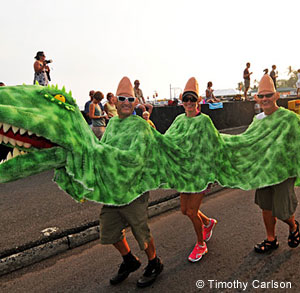
ST: Have you run into the folks from California Bicyclist and Southwest Cycling more recently and do you think they still believe triathlon is a fad?
Bob: Both magazines have long since gone the way of the 8-track player and the Seat Shifter. Is that surprising?
ST: Maybe it is kharma. Are you still in touch with Ned Overend?
Bob: Yep, Ned and Pam come to town a few times a year because their daughter Allison lives here. Ned has never changed. The guy is as humble and tough as he has always been. Like I said earlier, we have been so blessed to have such amazing spokespeople like Ned and Newby and Grip and The Man in our lives. Ned is still racing with the best in the world and I think he’s fitter now that he was 20 years ago. The man is a living legend and the toughest guy I know.
I still have something on him, though. When he was with San Diego Suzuki, he was the main man behind the Scrambler, an amphibious vehicle that was designed for duck hunters. When those things bogged down out in the wild, who had to go out there and fix those puppies? Yep, the man who was destined to become ‘The Lung’, the future Mountain Bike Hall of Famer, Mr. Ned Overend.
We forget that Dave Scott was a swim coach, Scott Tinley was hoping to become a paramedic and Scott Molina was flipping burgers at Kmart up in Northern California while Ned Overend was bailing out grounded duck hunters.
They were all tremendous athletes without a sport to call their own. In the early 1980’s, the growth of triathlon and mountain biking led to those amazing people and those sports connecting. It was a special time. I think one of the reasons those legends have always been so humble is that they know that they happened to be at the right place at the right time. When Ned won this huge Levi’s Mountain Bike Race in LA, no one had a clue who he was. That was the beginning of an amazing career.
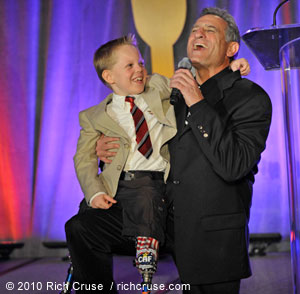
ST: When did you add the radio show, and what was the impetus?
Bob: Back in the early days, no one really considered endurance athletes in the same ballpark as the ball sport guys and gals. I felt that if we were on a sports radio station and people heard awesome interviews with our athletes right after they heard interviews with Joe Montana and Cal Ripken, they would start to consider our athletes as comparable, which they are. We have been blessed with amazing spokespeople like Dave Scott, Mark Allen, Chris McCormack, Craig Alexander, Paula Newby-Fraser, Steve Larsen, Lance Armstrong and so many others. Everyone has been so generous with their time and I think they understand that the more the main stream population learns about them and their sport, the more acceptance and exposure there will be for them and their sponsors. Everyone wins…which is sort of the way I like it. One time I was riding at Fiesta Island here in San Diego and I kept passing this woman who was running in the opposite direction. Every time I passed her she would point at her head and point at me. I couldn’t figure out what the heck she meant. I stopped and asked her and she told me she was listening to the latest interview during her run. That was really special.
ST: Who is the most fun person you ever had on your show, other than your co-host Paul Huddle?
Bob: Will Ferrell came on a number of times and we used to give him crap because at that point his movie career consisted of Night at the Roxbury and his role as Mustapha in Austin Powers.
We’d go, “Will, we think you should be up for an Academy Award for Mustapha. ‘I am badly hurt, but I’m not quite dead yet.’” Then Old School came out and the guy has been on fire ever since. His speech at the Competitor Awards when we honored him as our Celebrity Athlete of the Year is epic. It’s up on endurancesportsawards.com along with Davis Phinney’s and Taylor Phinney’s. Taylor’s is from last year and it’s hilarious. The one with Davis gives you goose bumps because very few people in the audience knew that Davis had Parkinson’s at that point. Mike Reilly and I had to hold the microphones steady for him because he was shaking so badly. The speech is an all-time classic.
ST: Tell us about the Endurance awards on Saturday night.
Bob: Kristin Armstrong, a former triathlete, was our Female Cyclist of the Year, Chris Carmichael was our Cycling Legend, Chris Lieto was our Competitor of the Year, Craig Alexander and Chrissie Wellington were our long distance Triathletes of the Year and Kara Goucher and Meb Keflezighi were our Runners of the Year. We show video on each of our award winners. Little 8-year old Cody McCasland, who is a double above knee amputee, was our Challenged Athlete of the Year and Rudy Garcia-Tolson, who just finished Ironman Arizona, was on stage for the presentation. I love the mix of endurance athletes. I get chills just thinking about the fact that before we brought Meb up to receive his award, we brought up the 1984 Olympic Gold Medalist at 800 meters, Joaquim Cruz, the 1983 New York City Marathon Champion Rod Dixon and then the man who has run 136 sub-four minute miles, Steve Scott, to present Meb with his award. We sold out the evening with 500 and the crowd went absolutely crazy for Meb. Everyone in that room has so much respect for all of the other athletes because they share an ability and a need to suffer to be the very best in the world. It’s something every age grouper shares with every elite athlete. There is nothing easy about running a marathon, finishing an Ironman or winning the world time trial championship. The Competitor Awards is a chance to honor those who work so hard 365 days a year. There’s actually some cool video of both Tri Expo and the Competitor Awards up on competitor.com
Stay tuned for the second part of the Bob Babbitt interview.


